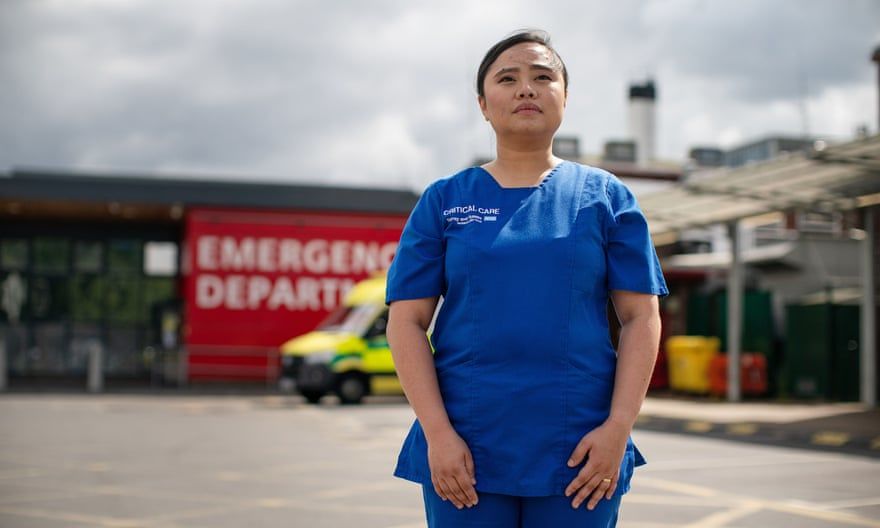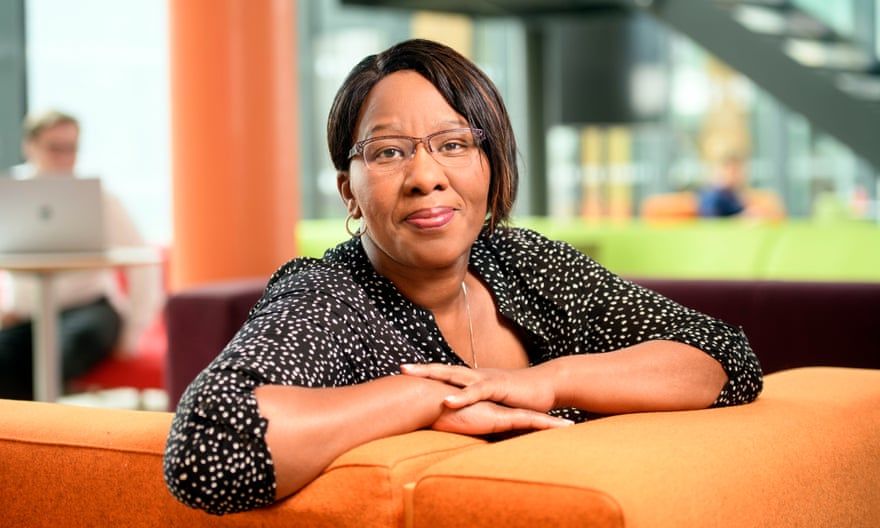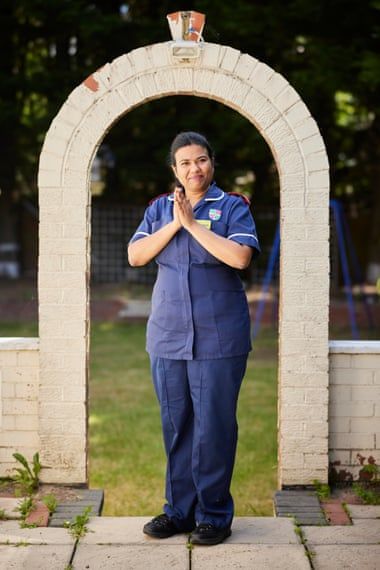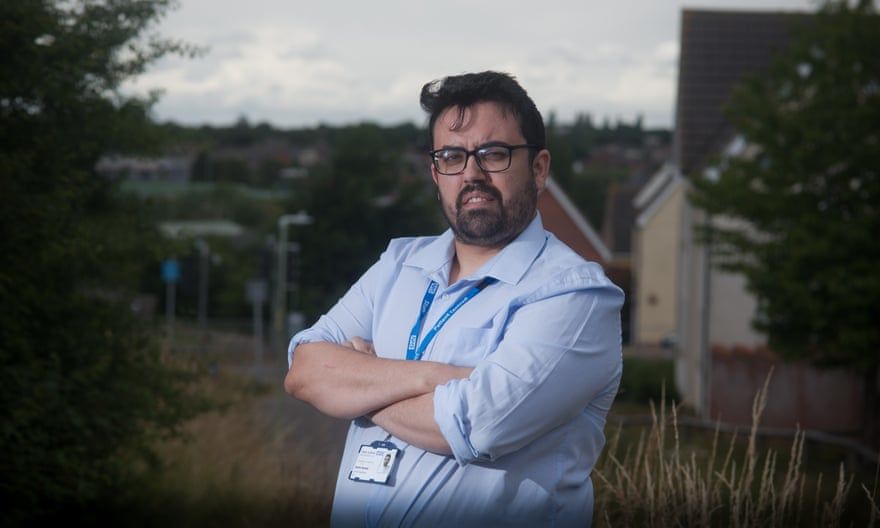
‘There were moments I questioned my passion for the job’: the overseas nurses helping to keep the NHS running
Even before the pandemic struck, there was a shortage of nurses in the UK. In January 2020, a survey by the Royal College of Nursing (RCN) found that almost three-quarters of nurses said the staffing level on their last shift was not sufficient to meet the needs of patients safely and effectively. Yet this month NHS England predicted that the government will not meet its manifesto pledge to boost the NHS’s nursing workforce by 50,000 by March 2024. The key reason? NHS workers are quitting in droves, citing burnout, fatigue and pay as factors.
Filling these gaps are nurses from overseas. Recently released figures for 2021 and 2022 from the Nursing and Midwifery Council (NMC) show that record numbers of nurses trained overseas are coming to work in the UK – almost half of new registrations. We spoke to four of them about their experience working in the UK.
Stephanie Padilla-Madriaga, intensive care nurse, Surrey and Sussex Healthcare NHS trust
 Stephanie Padilla-Madriaga outside the East Surrey hospital, Redhill.
Stephanie Padilla-Madriaga outside the East Surrey hospital, Redhill.
I landed in the UK from the Philippines for the first time on a freezing January day in 2016. I didn’t know anyone in the UK, other than some distant relatives in Northampton and Birmingham, and I had left my husband at home.
Even though I had a nursing degree, I had to pass a number of tests in order to work here, which cost me about £600. After that, the trust sent me sponsorship documents and a one-way ticket to Gatwick.
There is one more exam to pass in the UK, called an objective structured clinical examination (OSCE). That meant that when I first came here, while studying for it, I was working in a healthcare assistant role, even though I was already an experienced nurse.
The support that the Filipino community gave my cohort after we arrived was very warm. They helped us with everything from preparing for the OSCE to figuring out the transport system, which is culturally shocking to us. In the Philippines, we don’t follow timetables. If you want to get any transport vehicle, you just wave at it.
I value the way we handle patients in the UK with dignity and respect. I have learned to recognise dementia, which is still a taboo in the Philippines and not treated as an illness. I saw the value of nurses, helping and supporting the affected families.
The only downside about moving to the UK is the way the government asks for so much money from you. They’re asking you to leave your home country, then you have to reapply for your visa every three years and pay health surcharges of £1,000-plus over that time. After that, to get indefinite leave to remain, I paid almost £3,000, and it’s a further £1,000 for citizenship. We pay our taxes and have to work hard for this money.
Every now and then, I experience racism from patients: that we are taking their jobs, that we have to go back to our home country. You have to respond kindly, saying: “I didn’t ask for the job. It was your fellow men who came into our country and asked for us because they needed us.” And then there is unconscious bias. During the hardest part of the pandemic, a senior colleague said to me: “You guys are strong enough to get through this,” and it felt like: is it because I’m Filipina that I don’t have the right to get stressed or struggle? The trust condemns racism, and we have “Freedom to Speak Up Guardians” among our colleagues, whom you can talk to confidentially.
There were moments during the pandemic when I questioned my passion for nursing. I was working in intensive care, with deaths left and right, and having to resuscitate patients. Everyone had PTSD and we were given psychologists and encouraged to talk about our experiences. Even though it was hard with staffing, in 2021, the trust let me go for a leadership secondment to the general medical wards. It has made me a better and more resilient nurse. I have just returned to intensive care and I can see the value in what I do again.
During the pandemic, I needed an outlet to express myself, so I started a vlog, Absolutely Stephanie, to help international nurses settle in the UK. My husband joined me in the UK in 2017. I’m happy where I am.
Lucy Muchina, regional director for south-west England, RCN
 Lucy Muchina at the Royal College of Nursing.
Lucy Muchina at the Royal College of Nursing.
I trained in Nairobi, Kenya, and came to this country in 1998 to further my studies. At the time, we only did a diploma in nursing in Nairobi, but I wanted to do a BSc.
I was recruited directly by a person who ran a nursing home in Bristol. I think I was paid £3.20 an hour, but if you’re coming from a country that’s outside England, you think that’s a lot of money – until you arrive and realise how many hours you have to put in to be able to make what you need.
Before I could register as a nurse, I was being paid about the same as the person that was cleaning or doing the laundry – and you’re not given a timeframe as to how long you’re going to do that for. You’re stuck in a dark place. I had left a relatively good job in Nairobi, where I was a head nurse, so it felt like a big step down.
Clearly, there were cultural changes, too, but if there is one thing I enjoyed thoroughly it was the elderly patients, who were very loving. Half the time, I’m sure they couldn’t understand what we were saying, because of our accents, but they were lovely. We took time to talk to them and learned so much from them, and we taught them a few things about where we came from. It’s such a beautiful feeling when you know that you can have an impact on somebody else’s life at their time of need.
I spent more than two years in nursing homes, then moved to a job in the NHS, where there were opportunities to learn within the job and to apply to local universities. My children were young enough to be at nursery, so it worked fine.
I did my BSc in health and community studies, followed by a master’s in public health, while still working as a nurse. At the time, there was an NHS fund available for black, Asian and minority ethnic nursing staff to study to further their career, so I jumped at the chance and later joined Bristol’s public health team, where I worked for several years before moving on to the area’s clinical commissioning group.
Equality is an area that needs to be worked on. We’re doing ourselves a disservice if we don’t recognise and acknowledge that nurses are coming to the UK with a lot more to offer than we expect.
This may sound off-putting to new recruits, but it will take a good five years before you feel like you belong and don’t keep wanting to pack your bags and go away. But I have thoroughly enjoyed my experience here.
Sharon Sundersingh, senior sister, Luton and Dunstable hospital
 Sharon Sundersingh at home in Luton.
Sharon Sundersingh at home in Luton.
When I was 26, just after my first wedding anniversary, I travelled to the UK alone. I’m from Tamil Nadu in south India and I came here in 2009 after Luton and Dunstable hospital had come to India to recruit nurses. I had a degree in India and was trained in one of the best college hospitals in the country, but back then the doctors gave the orders with minimal input from nurses, so I thought it would be best if I explored outside the country.
I’ve stayed with the same employer here over the years and luckily my husband, an IT professional, was able to get a job in the trust, too.
Back home, there’s a very different picture of what life in the UK will be like – that you come here, earn money and live a luxurious life. You tend to have obligations to send support back home, so when many nurses come here, all they do is work – regular shifts plus overtime. But they need to live their lives here as well, and progress in their careers. I am part of the British Indian Nurses Association (BINA); we organise workshops to help people apply for jobs and learn how to perform in an interview.
Mostly, patients are happy to see an international nurse. They like and appreciate us, but you do get comments that hurt at times. Once, in a ward with predominantly black and Asian nurses, a man said: “I’m in the middle of a foreign jungle with all these nurses here.” They call us names like “brownies” and they say: “Get away, I need a different kind of nurse.” But we think: “OK, they are not in good health, they are not in a good state of mind.”
You do get a lot of appreciation and recognition, too, with people acknowledging that you are anxious because you don’t know what is happening back home during the pandemic while you’re here supporting them.
During Covid, trusts tried to be supportive, but international nurses tend to keep things to themselves. BINA has representatives around the country, and I think the Filipino Nurses Association also made an effort to talk to nurses, so that the trusts could help them sort out their problems.
There are loads of international nurses here who don’t have NMC registration and are still working as healthcare assistants because they’ve not been able to clear the English language requirements. Why isn’t the NMC tapping into this workforce? Getting them through those requirements is cheaper than recruiting somebody from abroad.
But I would recommend coming to the UK as a nurse. The NHS is a very good place to bring your skills and knowledge, and explore and learn new skills – it’s give and take.
André Santos, registered steward and learning rep, Suffolk branch chair and eastern region board, RCN
 André Santos in Stowmarket, Suffolk.
André Santos in Stowmarket, Suffolk.
It has been 11 years since I came to work in the UK, with all my dreams in my bags. I was a registered nurse in Portugal, but, like most of the eurozone at the time, we were in a recession. A lot of my generation couldn’t find employment and decided to leave. It was a leap of faith, but the UK had a good track record in terms of career progression for nurses.
I was recruited by Bupa to work in a small nursing home. The first few days were the most daunting, but when I came to Suffolk people were really nice and all my fears went away.
In the nursing home, there were mainly Filipino and Indian nurses. After about eight months, I moved to Addenbrooke’s NHS hospital in Cambridgeshire, where there were also Zimbabweans, Portuguese, Spanish, Italians – a really big mixture of people.
In Portugal, it’s really hard to progress. I would never have been a ward manager at 34, so it was a no-brainer to come here, but it was a culture shock. It was really hard at first to understand people’s accents. And the expressions! The classic one is “spend a penny”. What do you mean, “spend a penny”? Or when you say “beat around the bush”? In Portugal, we watch much more American television than British television.
Brexit was a big slap for me and for a lot of my Portuguese, Spanish and Italian colleagues. The European common market led to this situation, as we did not need visas or to sit the OSCE test. This led to easier and unethical recruitment of EU nurses. There were newspaper articles about Romanian nurses not being able to understand English, but actually it was indiscriminate recruitment that created that problem. If they had recruited professionals properly, with the proper English interview and assessment of skills, we would not have been in that position.
A lot of Portuguese and Spanish nurses felt unwelcome and left after Brexit, which makes me sad. However, being a mentor to overseas nurses, I’ve become passionate about defending their rights and highlighting their importance in the NHS. Independent of colour, race or gender, they all came here with the dream of being able to progress in providing care within the system. We all share the same passion for what we do.










